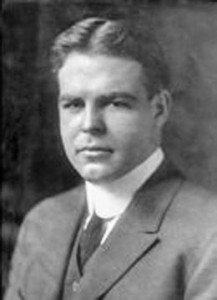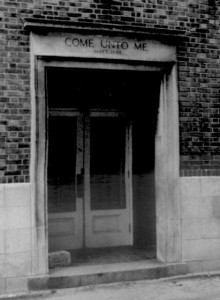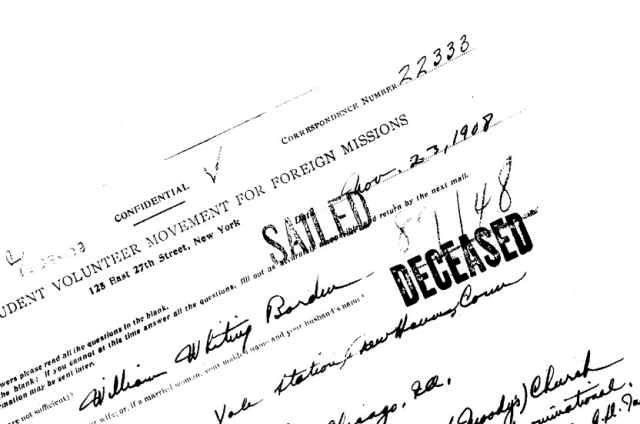 Bill Borden: Challenge to a Consecrated Life |
He was only 25 at his death, yet his life was one of great impact. When news of his death was cabled from Egypt, the Princeton Seminary Bulletin declared, “No young man of his age has ever given more to the service of God and humanity!”
A prominent Yale professor stated, “No undergraduate, since I have been connected with Yale, has done so much for Christ in four short years than he did” (H.W. Wright). His name was William Borden and his story affords a stirring illustration of a life totally consecrated to Christ.
His consecration began early. Borden had the blessing of growing up in a godly home, where family prayer and Bible reading were staples. Once, when William was only six, his mother had the children write on a piece of paper what they would most like to be when they grew up. William wrote, in less than perfect orthography:
“I what to be an oneast man when I grow up, and true and loveing and kind and faithful man”
To his last day, by the grace of God, the man could have looked into the eyes of the child without shame!
It was as a child of seven that the lad heard R.A. Torrey give a challenge to dedicate one’s life to serve God. At the invitation, William quietly rose (in his blue sailor suit)—and went forward. It was a consecration from which he never drew back.
After graduating from the Hill school, Borden went to Yale. Arriving, he wrote into the fly-leaf of his pocket testament, “Thy word have I hid in my heart that I might not sin against Thee” (Psalm 119). But though he resolved to hide the Word in his heart he also resolved not to hide it from his classmates.
Stir Up Your Gift
We grow by expression. When I first started out to be a Christian I couldn’t stand up in a prayer meeting and use three sentences consecutively, but I made it a rule to speak whenever I got a chance and so I overcame my natural diffidence. God blesses me because I am determined to do something for Him. I could have sat still and withered and mildewed like a lot of you.
—The Rev. W.A. (Billy) Sunday
During his first term as a freshman Borden searched out and gathered up Christian classmates for daily prayer. Charlie Campbell—the first to join him—later recalled: “These meetings were held in Bill’s room just before we went to breakfast…. The time was spent in prayer after a brief reading of Scripture. Our object was to pray for the religious work of the class and college and also for those of our friends we were seeking to bring to Christ.”
By the end of the year, this daily class prayer meeting had spread to each class! It had not passed down from the seniors; it had come up from the freshmen. And blessing was given in answer to those prayers, for the little band rejoiced to see several companions soundly saved.
Borden was concerned that no one fall through the cracks. At the beginning of sophomore year, he wrote home to his Mother of his strategy: “Charlie, Jeff and I got together today and divided up the class [about 300 men]. The plan is for each to have 1/4 of class as his parish and to know every individual man. It will take time; but we believe it will pay.”
Naturally, some were tougher prospects than others—the dancers and dicers; womanizers and whiskey drinkers. One of Borden’s companions involved in the divvying up later described: “The names were gone over one by one and the question asked, ‘Who will take this person or that?’ When it came to one who was a hard proposition there would be an ominous pause. Nobody wanted the responsibility. Then Bill’s voice would be heard: ‘Put him down to me!’”
“Bill hunts up the worst skunk in College and goes after him,” said a sailing friend—probably no mean judge of skunks.
It was in chasing down “skunks” that Bill became aware of another mission field. New Haven, as a seaport midway between New York and Boston seemed to gather every sordid sort of riff-raff and vagrant, tramp and hobo. Saloons, gambling halls, and brothels sprang up in abundance to accommodate the burgeoning vice. Not one rescue mission existed to bring relief and the Gospel to the down and out.
Borden felt something needed to be done so he gathered his friends to pray, rented a room in a dive on the strip, and began to hold evangelistic meetings. Thus was born the Yale Hope Mission.
As the work grew, Bill, unostentatiously wealthy, bought the entire building for a halfway house. Many a shattered life was reclaimed for Christ in that place. One of Bill’s first “reclamations” later reminisced:
 “Not till the books of heaven are opened will you know what Bill Borden done by opening Yale Hope Mission…. He’d hasten through his address and get to work with the men. As soon as the invitation was given to come forward he would be off the platform and right down among the men…. He had a habit of putting his hand on man’s shoulder and they’d almost alway break down when he spoke to them. I never knew a feller just like Bill. I’d like to get hold of one of his pictures. Seems to me if I saw one I’d ‘most try to steal it. He could talk to anyone; didn’t matter who they was. And he’d get down with his arms round the poor burly bum and hug him up. Never knowed his like in this world. I know he must have done for hundreds, just what he done for me.”
“Not till the books of heaven are opened will you know what Bill Borden done by opening Yale Hope Mission…. He’d hasten through his address and get to work with the men. As soon as the invitation was given to come forward he would be off the platform and right down among the men…. He had a habit of putting his hand on man’s shoulder and they’d almost alway break down when he spoke to them. I never knew a feller just like Bill. I’d like to get hold of one of his pictures. Seems to me if I saw one I’d ‘most try to steal it. He could talk to anyone; didn’t matter who they was. And he’d get down with his arms round the poor burly bum and hug him up. Never knowed his like in this world. I know he must have done for hundreds, just what he done for me.”
A classmate observed of Borden: “He is a missionary, first, last and all the time.” It was true. There was nothing spasmodic about Borden’s zeal. It was as even as falling rain. A passion for souls seemed never absent from his mind. He appraised his material possessions and natural endowments not by a standard of self-indulgence or worldly ambition but by their adaptability for building the Kingdom of God—and scarcely a moment of his life was lost to that great end.
The issue for Borden was simply one of obedience. “There must be a definite determination to do God’s will,” he once urged a gathering of students. “Do you lack power? Ask yourself, ‘Have I ever truly surrendered? Have I definitely consecrated myself? Put myself at God’s disposal, to use as He deems best?’” And then he explained that consecration must have its unceasing issue:
“Obedience, which is the price of power, must not only be absolute but daily. Are we paying this part of the price?”
For Borden, surrendering to God’s prompting in his own life meant preparation for the foreign field. While a freshman at Yale, he had attended a conference at which Samuel Zwemer had voiced an appeal for the Muslim world. He spoke of 15 million Muslims in China where not one single missionary was set apart for their evangelization. “Of course it will cost life,” concluded Zwemer, “It is not an expedition of ease nor a picnic excursion to which we are called. It is going to cost many a life. Leadership in this Movement has always been leadership in suffering.”
Borden returned to Yale committed in his heart to that great enterprise to build where none had yet laid a foundation: among the Muslims of China. Zwemer’s words were true in Borden’s case. His going did cost him his life. He never reached the Muslims in China.

While ministering in Egypt, en route to his final goal, he contracted cerebral meningitis. His mother boarded a ship to reach him but arrived only hours too late, in time only to be present at the small missionary gathering at the graveside. Samuel Zwemer was among them and fittingly read from Pilgrim’s Progress of the death of Valiant for Truth:
“My sword I give to him, that shall succeed me in my pilgrimage and my courage and my strength to him that can get it. My marks and scars I carry with me, to be a witness for me, that I have fought His battles who will now be my Rewarder…. So, he passed over, and all the trumpets sounded for him on the other side.”
Far away in Kashmir news of Borden’s death reached a young missionary, Sherwood Day—one of his old friends and fellow students at Yale. He entered these words in his journal:
“I have absolutely no feeling of a life cut short. A life abandoned to Christ cannot be cut short. ‘Cut short’ means not complete, interrupted and we know that our Master does no half-way jobs. We must pray now, that those to whom God wants this to appeal, may listen.”
Jon Hinkson
Quotes are drawn from Borden of Yale by Mrs. Howard Taylor.


4 Replies to “Bill Borden”
Comments are closed.